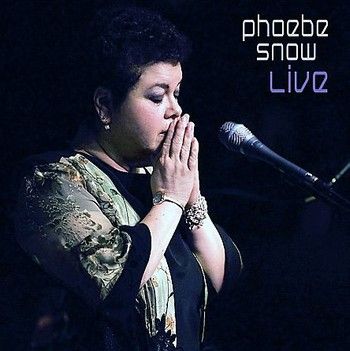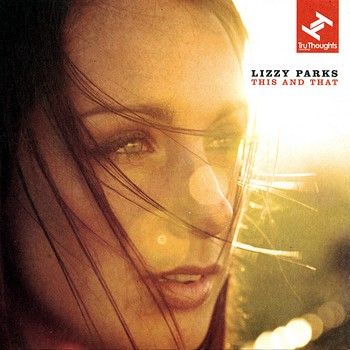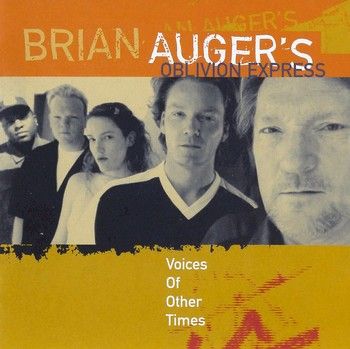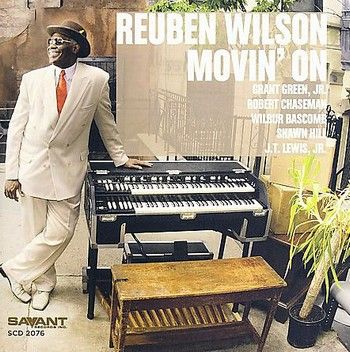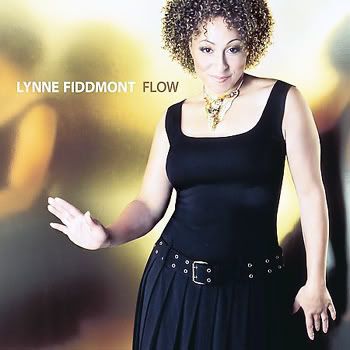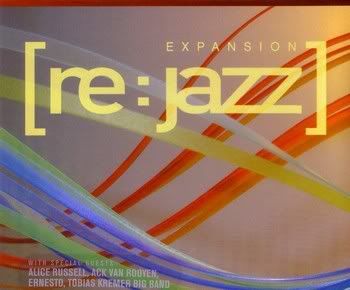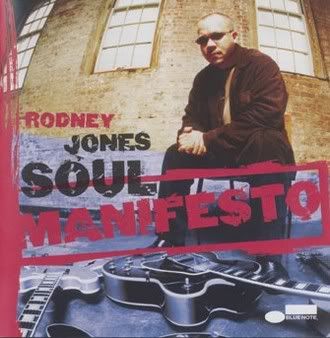
Rodney Jones - Soul Manifesto - 2001 - Blue Note
Terrific soul jazz/funk album from the great underrated jazz guitarist, Rodney Jones . Check out his albums, The Undiscovered Few, X Field, Dreams and Stories.
TRACKS
1.Groove Bone Part 1
2.Soul Makossa / Wake Up Call - (interlude)
3.Soul Manifesto / Roll Call - (interlude)
4.One Turnip Green
5.Ain't No Sunshine
6.Mobius 3
7.Soup Bone
8.Soul Eyes
9.Groove Bone Part 2 / Last Call - (interlude)
MUSICIANS
Rodney Jones: Guitars
Maceo Parker: Alto Saxophone
Arthur Blythe: Alto Saxophone
Dr. Lonnie Smith: Hammond B-3 Organ
Lonnie Plaxico: Bass
Idris Muhammad: Drums.
REVIEWS
Guitarist Rodney Jones departs from the mainstream fare of his most recent recordings ( The Undiscovered Few, Blue Note 96902, 1999 and My Funny Valentine, Timeless 162, 2000) and testifies his funk philosophy on Soul Manifesto. Joined by Funk/R&B specialists Maceo Parker, Arthur Blythe, and Dr. Lonnie Smith, Jones weaves a hypnotic tapestry with a limbic collection of originals and standards so funky the listener might have to leave the room or succumb to the groove.
The foundation of Jones's Soul philosophy is grounded in Gospel, Funk, and the Blues. He began playing guitar at age 6, beginning formal lessons age 8. He saturated himself with the Funk-forefront of the day: Jimi Hendrix, Sly Stone, and the formidable James Brown. “You have soul that was created by God, and you have soul created by James Brown. I've always been fascinated by that connection,” says Jones. Jones joined the James Brown Mythology when he linked up with Brown alto saxophonist Maceo Parker for Parker's breakthrough Roots Revisited (Verve 843 751, 1992). Jones went on to work with the funkmeister for five years (and that definitely shows on this recording).
Jones bookends this recording with the original “Groove Bone, Parts 1 and 2.” He establishes the mood of the recording with these pieces while jamming through the other funky tone orgies “Soul Makossa,” “Mobius 3,” and “One Turnip Green.” Standards include a soulful “Ain't No Sunshine” and “Soul Eyes.” The band was well chosen, particularly Maceo Parker and Arthur Blythe. They truly reveal the soulfulness of the alto saxophone. Makes one wish King Curtis was on hand for the tenor chair. Is this Jazz? Quoting Mark Corroto in his primer on funk, “As the tee-shirt sez, 'F*** Art, Let's Dance.” Review © Michael Bailey (allaboutjazz.com)
Soul is the truth. It’s what is real. From deep inside, Soul is who you are.
Here, we are presented with a soul manifesto. It’s not taught. It’s caught. It’s not about the beat. It’s about the vibe. It’s no fad or trend. It’s a place where it starts and how it ends. Soul is life itself.
It shouldn’t surprise anyone this is the manifesto put forth by Rodney Jones, one of the brightest, most idea-wise guitarists in jazz. Still, “Soul Manifesto” hardly seems a logical sequel to 1999’s “The Undiscovered Few,” a lovely tribute to the affirming and affecting influences in the guitarist’s being.
Rodney Jones is a deeply reflective young man, perhaps even erudite. Instead of a dissertation, however, he delivers feeling. One listen and you can feel the warmth and profound depth he coerces from a hollow body of wood and six strings. He’s got soul. He’s just serious about it.
He’s got credentials too. Mr. Jones has a particular gift for getting heard in good company. He’s waxed four sides with Maceo Parker, got down to the get down with James Brown and fired up some of Jimmy McGriff’s funkiest moments. He’s also played it straight with Dizzy Gillespie, Ruth Brown and Lena Horne and, for Blue Note, arranged Ellington in a classical setting for the conductor Simon Rattle.
The “Soul Manifesto” is delivered by nothing less than a dream team of soul men, all especially chosen by the guitarist for the occasion. These guys are rooted in soul credibility. Rodney puts it this way, “they can reflect, reach deep and get you shakin’ your money maker too.” Call it a truth summit. These cats couldn’t fake a note if they tried.
Up front, Jones is joined by former James Brown sax man (and the guitarist’s former boss) Maceo Parker, jousting on wings of fire – for the first time ever – with Arthur Blythe, whose rich, soulful flights of freedom first touched Jones when they worked together in Chico Hamilton’s group.
Rodney’s rhythm engine here is positively nuclear: organist Lonnie Smith, who Rodney first jammed with in Harlem when the guitarist was a mere 15, bassist Lonnie Plaxico, Rodney’s bassist of choice and, of course, His Majesty, King Breaks, Idris Muhammad, who laid down the sound, who “originated the stuff.”
There’s no posturing among these men. This is truth telling. They reflect on several influential moments in Rodney Jones’s life, from Manu DiBango’s “Soul Makossa” and Bill Withers’s “Ain’t No Sunshine” to Mal Waldron’s lovely “Soul Eyes” and lay down their own heavy-duty grooves in the bookending “Groove Bone” and the bluesy “One Turnip Green” (inspired by Rodney’s guitar heroes: Grant Green, Kenny Burrell, Nathen Page, Barney Kessel, George Benson and Wes Montgomery).
But just listen. Feel it. A few bars is all it takes. Rodney’s three-year-old daughter, Cara, heard it right away. From the first few notes, she jumped up, danced around and said out loud – this is the soul manifesto! That’s what it’s really all about, isn’t it? © Douglas Payne www.dougpayne.com
Who's got the funk? Well, this month's answer to that age-old question is Blue Note. Not jazz-funk, mind you, or any new-fangled variant, but proper old-school funk with a few jazz licks thrown in. This disc could have been cut 30 years ago. As the contributors include Dr. Lonnie Smith, Maceo Parker, Arthur Blythe and Idris Muhammad, the actual band could have probably made this record back then. Choice of material such as "Soul Makossa" and "Ain't No Sunshine" only adds to the time-warp effect. It is very strange. Don't get me wrong, Soul Manifesto is a solid and pleasurable set but it is hardly the most forward-looking release of the year.
If such resolute back-turning on the contemporary doesn't bother you and if the JBs meet Jimmy McGriff or Grant Green sounds like fun then Rodney Jones and friends will have you happily toe-tapping for hours. It must initially be admitted that Jones, though a supreme rhythm-maker, is a fairly characterless soloist. No real worries, as the above mentioned stalwarts more than compensate in the solo stakes. Furthermore, as with all the best funk outfits, the groove is the thing, not any individual flashiness. And groove there is -- by the bucketload. This is a no-frills operation -- tightly organised, rock-steady and built to last.
Just a glimpse at the song titles tells you what to expect. The album opens and closes with the horn led "Groove Bone" -- a more relaxed JBs-early Kool and the Gang, riff-led excursion. "Soul Manifesto", "One Turnip Green" and "Soup Bone" are titles that could be found on any number of late-'60s, long-deleted albums. File under Rare Groove (Revisited). Like those forebears, Manifesto could have been a bit wearing in one take and there is reason to be thankful for the downtempo numbers, which save the listener from too one-dimensional an experience.
As it is, there is just enough going on to keep matters fresh. The standard of playing helps, of course. Jones has gathered together some of the best and they are all in good form, to the point where he is, if anything, overshadowed by his fellow funksters. Pride of place, for me, goes to the good Dr. Smith -- who is cropping up all over the place just lately. His left-of-centre Hammond style is just what this project needed and on the, otherwise pointless, cover of Manu Dibango's Afro-Funk, Loft anthem, "Soul Makossa" he outdoes himself. Little flicks and melodic stabs are his specialty and he has saved some of his juiciest for this session. His solo on "Mobius 3" is just about B-3 heaven.
What can be said of Maceo? He is surely the king of this genre. He does nothing new here but neither does he do anything wrong. Never the sort of player that you particularly remember for this or that solo, he simply and effortlessly delivers a sound you know so well and love like an old friend. He has worked with Jones before (and vice-versa). They seem to have formed a close musical bond -- and it shows in the seamlessness of their exchanges. Arthur Blythe comes from a different soul background (more Philly) and is also closer to the mainstream jazz tradition. Though never in trouble, he is at his most entertaining when he can fly the coop a little, as he does on the old Coltrane ballad "Soul Eyes". Blythe has been out of the spotlight in recent years. It hasn't hurt his tone -- which still has that sweet, swaying quality which made him so popular back in the '80s.
Drummer Muhammad and bassist Lonnie Plaxico do what is required and do it well. Often Muhammad adopts an almost Memphis, fatback style that really works and Plaxico, too, keeps it very rhythm and bluesy, to considerable effect. "Soup Bone" -- which has a Booker T ring about the very title -- harks back to the days of Sonny Thompson or Maxwell Davies. It conjures up a world of small clubs on the black touring circuit with the band warming the crowd up for the big singing star. Similarly, on the long, outro version of "Groove Bone" the James Brown band of Famous Flames vintage is evoked rather than the post-Bootsy era. There are some deep roots behind each and every song.
Jones himself presides over and adds to this rich mixture. If he does not quite have Smith's individuality or Parker's authority, he nonetheless knows how to work a riff for all it is worth. I think he is essentially a sideman but his own compositions stand up well to the covers, so he is no slouch in that area. I prefer him chording to using single string runs, although occasionally he does surprise and get fast and fluid ("Groove Bone" again for the best example).
A quick word about "Ain't No Sunshine". Now, the last thing the world needs is yet another version of this chestnut. In fact, the reading of it here is delightful and gives Maceo a chance to show that he can be as sensitive and full of feeling as the next man. Slipped in between the more driving numbers, it comes across far less creakily than it has any right to. Which, indeed, is a case for the album as a whole. It should have been a stale exercise, a mere re-hashing of former glories -- but it isn't. At times it does drift towards the mundane. Mostly (with particular reference to the organ) it is crisply played and very alive.
Safe and certainly not innovative, Soul Manifesto is still worth catching up with. Its very lack of pretension is surely part of its charm. Like all the funkiest albums, from the flares and Afro, brass led affairs to the Hammond groups of the sixties, it never tries to over-complicate or do anything that gets in the way of the groove. When Blue Note updates its excellent Blue Funk series in a few years time, tracks from this album will find a ready home. © Maurice Bottomley © 1999-2007 PopMatters.com. All rights reserved.
Rodney Jones’ Soul Manifesto, alongside the powerhouse jazz musicians that comprise his band, is nothing short of a legendary performance. Most notable in Rodney Jones’ discography is arguably his tenure as guitarist for Maceo Parker. But even with his extended history of playing with the greats of the jazz and funk genres, Jones comes alive with this band. Soul Manifesto, the album, features an all-star lineup of the greatest living members of the jazz world. Maceo Parker, Dr. Lonnie Smith, Arthur Blythe, Lonnie Plaxico, and Idris Muhammad worked exclusively with Jones on the album, and initially, I was somewhat disappointed that they weren’t his touring band. When I arrived on campus for this show, I’d soon find solace in the enchanting talents of several other globally renowned players. Bassist Lonnie Plaxico is Jones’ common link between his touring band and the Blue Note recording. Plaxico’s playing is mind-blowing, to say the least. His skill is light years beyond my own comprehension, and his soul and deep-rooted rhythms had the audience gripping their armrests so as not to fall out of their seats. Oliver Von Essen, a native of Frankfurt, Germany, played keys as a mythical creature would terrorize a medieval British township. He was a monster, displaying the power and control of his sound as only the best in the world can manage. Tenor Saxophonist, David Mann, laid out all the complexities that a horn can offer on top of the driving funk. In classic jazz style, he meandered seamlessly between the high-end viscosity of good funk to the soulful and haunting melodies of slower tempos and melodic prose. Drummer, Ray Marchica, rounded out the band at it’s base elements. His percussive skill is a feat to watch and hear, and his subtle transitioning between solos was both traditionally and progressively masterful.
Rodney Jones, the captain of this flagship, used both his modesty and intensity on guitar to remind us that music has the ability to pick us up when we’re down, calm us when we’re tense, and heal us in times of need. Not since I discovered Grant Green several years ago have I been so speechlessly impressed with a guitarist. I had the honor of seeing this show front row with seven or eight students of guitar at the Oswego school of jazz. Simply put, Rodney Jones made them cringe in their seats. “This,” I could imagine them thinking, “this is what I’m in it for.” The show wasn’t the end of the road for us that night, however. It was merely the beginning. When the show ended, we made our way to a bar down the road where the late night jam-session was to take place. The boys of Soul Manifesto graced us with their presence. For approximately the next three hours, everyone, including Jones and co., rotated around the instruments, taking turns in a show-down like setting, grooving together and battling with solos and tonal ideas. It was intense. The students from the school drew their guns against the big cats. And they won. It wasn’t a measure of skill that won the battle. It was the experience. Certainly, we were all schooled when Jones ripped through a hundred and eighty seven notes in approximately four seconds. We were toppled when Plaxico stampeded across his electric bass’ fret board, sending us sprawling from our seats in jubilant hysteria. But the students got to play, if only in a brief, free-form setting, with the greats. By the end of the night, we were all enlightened to some extent. We had transcended the turbulent world around us and experienced something that words fall short of describing. It was music: soul-infecting, groove-you-till-you-drop music. And man was it cookin’. © Kyles Davis http://stateofmindmusic.com/articles_read.php?articleId=36
BIO
Born: Aug 30, 1956 in New Haven, Connecticut .An underrated cool-toned guitarist who sounds at his best in straight-ahead settings, Rodney Jones had his highest visibility during his period with Dizzy Gillespie (1976-1979), when he was in his early twenties. Jones had previously worked with Jaki Byard and recorded with Chico Hamilton, and he would follow the association with Gillespie by working for a time as Lena Horne's accompanist. As a leader, Jones has recorded for Timeless (in 1978 and 1981), the RR label, and in the late '80s for Minor Music. © Scott Yanow, All Music Guide



